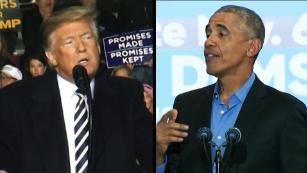CNN Poll: In final days, Democrats maintain advantage
WASHINGTON (CNN)On the eve of the midterm elections, Democrats continue to hold a double-digit lead over Republicans in a generic congressional ballot among likely voters, according to a new CNN Poll conducted by SSRS. The party's 55% to 42% advantage in the new poll mirrors their lead in early October and is about the same as the 10-point edge they held just after Labor Day.
That's a slimmer edge than the party held in CNN's final poll before the 2006 midterm elections and similar to the Republicans' 10-point advantage just before the 2010 midterms.
Democrats benefit from a massive gender gap that has persisted throughout the fall (women favor Democrats 62% to 35%, while men are about evenly divided, 49% back the Republican, while 48% support the Democrat in their district), a wide lead among political independents (53% for the Democrat to 39% for the Republican), and strong support from black and Latino voters (88% of black voters and 66% of Latino voters favor the Democrats).
The gender gap cuts across lines of race and education, with non-white women (79% favor Democrats) and white women with college degrees (68% back the Democrat) breaking most heavily for the Democrats, while white men (57% Republican) and particularly white men without college degrees (65% back the Republican) are most deeply behind the GOP.
About 7 in 10 likely voters say that when they cast a ballot on Tuesday, they'll be sending a message about President Donald Trump, and more often and not, the message those voters want to send is one of opposition.
Overall, 42% of likely voters say their vote will be to express opposition to the president, while 28% say that it'll be to support him.
Another 28% say their vote isn't about the president. That level of opposition is similar to the way likely voters felt just ahead of the 2006 election, when 41% said they were voting to oppose then-President George W. Bush. Fewer voters in that year, just 16%, said they were turning out to support the president.
Trump's approval rating in the poll stands at 39% overall, with 55% disapproving, slightly worse than in early October, when 41% approved of his performance and 52% disapproved.
That is the worst pre-election approval rating for any president approaching their first midterm election in polling dating back to Eisenhower.
Among likely voters, a majority, 52% say they strongly disapprove of the way the president is handling his job, 35% say they strongly approve of his work as President, and just 11% of those likely to vote on Tuesday say they don't have strong views on Trump.
With the election just days away as the poll was conducted, enthusiasm was up among both parties' voters, but Democrats advantage in enthusiasm narrowed to just 4 points: 68% of Democrats and Democratic-leaning independents were enthusiastic about voting, while 64% of Republicans and Republican-leaning independents said the same.
A majority of likely voters (52%) say they consider health care extremely important to their vote for Congress on Tuesday, with immigration and Trump closely behind at 49% each. Just behind that, 47% each say the economy, corruption and gun policy are extremely important to their vote.
But voters' issue priorities are sharply divided by party. Among Democrats, 71% call health care extremely important. That stands at 37% among Republicans. Almost two-thirds of Republicans (64%) say immigration is extremely important to them, while that dips twenty points to 44% among Democrats. And while 60% of Republicans call the economy extremely important, just 39% of Democrats agree.
Most Democrats consider the Russia investigation a critical part of their vote (53% say it's extremely important), but just 8% of Republicans say the same. The one issue they both agree on: Trump. Majorities in both parties say he's extremely important to their vote (55% of Republicans, 53% of Democrats).
About half of likely voters say that if Democrats win control of Congress, the country would be better off (48%), while about a third say it'll be worse off (35%).
Most Americans (56%) think it's likely that a foreign government will interfere with the US elections this fall, and 74% think that if it happens, it would be a crisis or a major problem. Worries about foreign interference are more widespread among Democrats, 74% of whom think it's likely to happen and 90% of whom consider it a major problem.
Among Republicans, just 33% think such interference is likely and 57% consider it a major problem or more.
The poll also finds 8 in 10 Americans think the country is more deeply divided this year on major issues than it has been in the past several years. That's slightly lower than the 85% who felt that way just after Trump's election in 2016.
As many as 74% say that the recent tone of American politics is encouraging violence among some people. That's about the same as said so in a CBS News poll conducted shortly after a Republican member of Congress was shot during a June 2017 congressional baseball practice for a charity event.
The CNN Poll was conducted by SSRS from November 1 through 3 among a random national sample of 1,518 adults reached on landlines or cellphones by a live interviewer. Results for the full sample have a margin of sampling error of plus or minus 3.1 percentage points, for the subset of 1,151 likely voters, it is plus or minus 3.5 percentage points.

















No comments:
Post a Comment